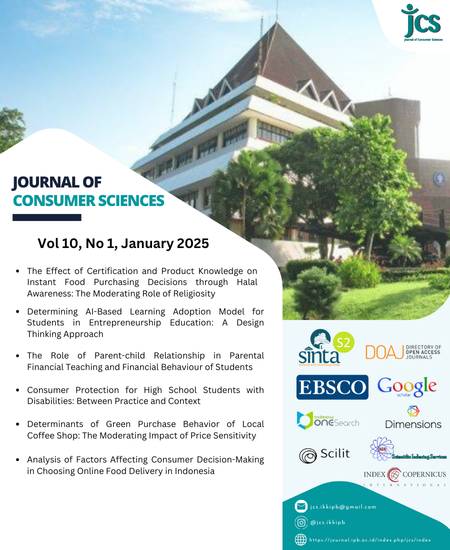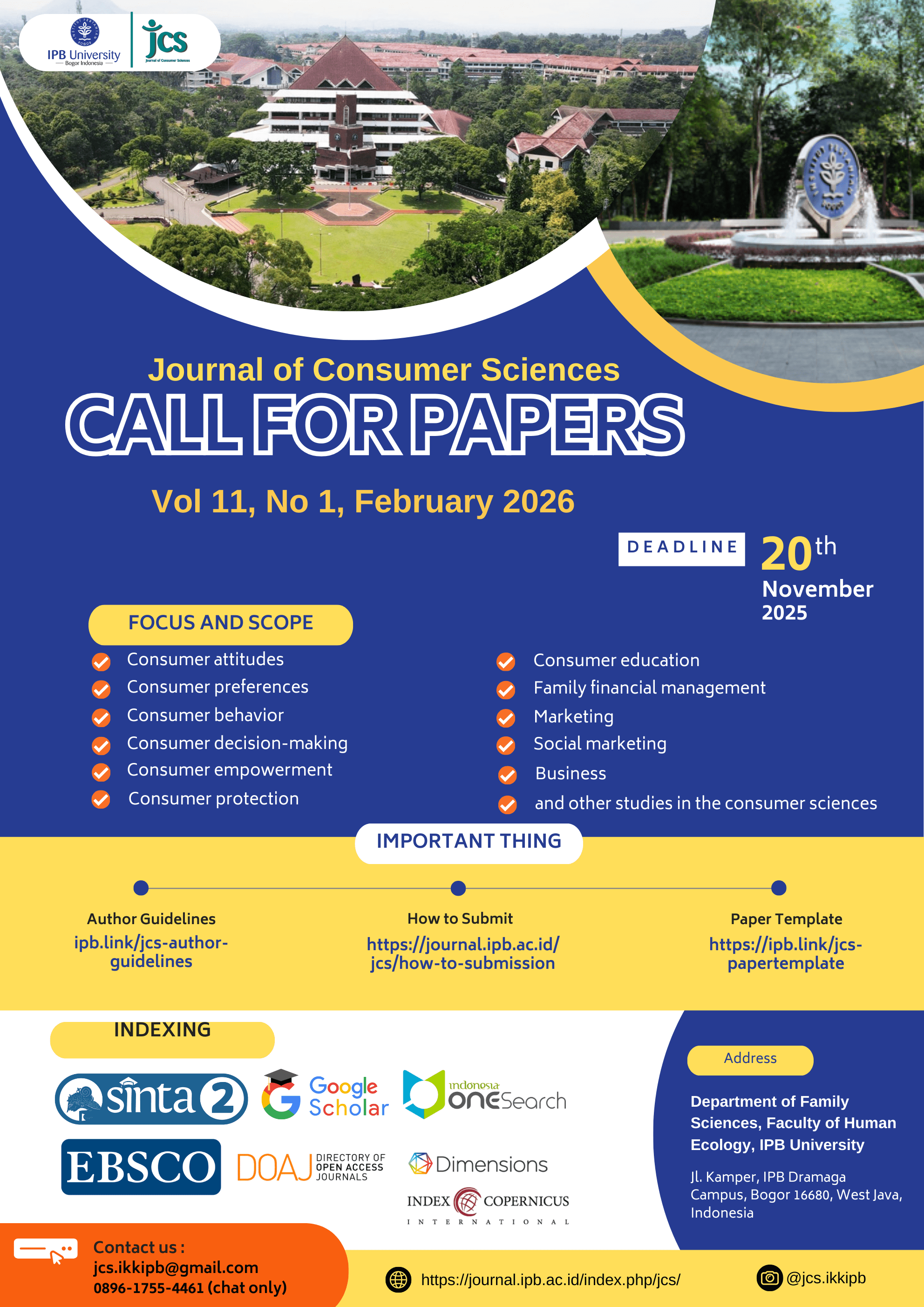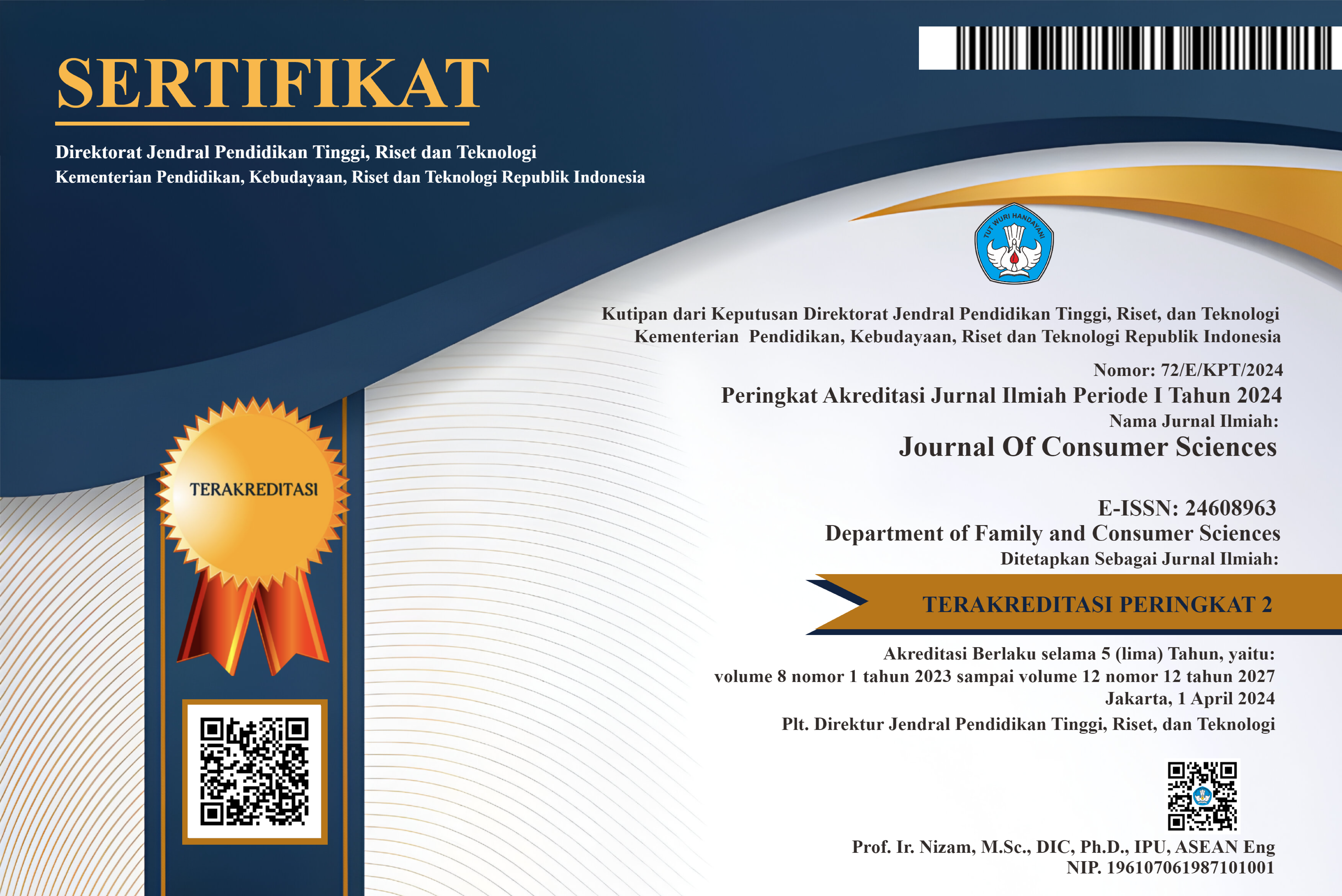Exploring the Impact of Perceived Justice and Complaint Handling Satisfaction on Trust and Commitment in Indonesia's E-commerce Fashion Sector
DOI:
https://doi.org/10.29244/jcs.10.1.145-172Keywords:
complaint handling, customer commitment, customer loyalty, customer trust, perceived justiceAbstract
Background: Indonesia's rapid growth in the e-commerce fashion sector presents opportunities and challenges, particularly in addressing consumer dissatisfaction during post-purchase experiences. Key challenges include product misrepresentation, delivery delays, or unmet expectations, which can lead to negative behaviors such as complaints, reduced loyalty, and distrust toward sellers.
Purpose: This study investigates the impact of perceived justice dimensions—interactional, procedural, and distributive—on satisfaction with complaint handling and its subsequent effects on customer trust, customer commitment, and customer loyalty.
Methods: This study employed a cross-sectional survey with a purposive sampling technique, collecting data from 174 respondents in the Jabodetabek region. Structural Equation Modeling-Partial Least Squares (SEM-PLS) was used for analysis.
Findings: This research reveals that distributive and procedural justice significantly influence complaint handling, while interactional justice has a smaller yet notable impact. Complaint handling, in turn, significantly enhances both customer commitment and customer trust, with customer commitment emerging as a stronger driver of customer loyalty. Notably, customer trust's direct effect on customer loyalty is insignificant, suggesting that emotional engagement through commitment plays a more pivotal role in fostering loyalty.
Conclusion: These findings underscore the importance of fair complaint resolutions, efficient processes, and empathetic communication in maintaining customer relationships.
Research implication: The findings provide actionable insights for e-commerce businesses to improve customer satisfaction with complaint handling, particularly emphasizing the critical roles of distributive justice and procedural justice in fostering satisfaction.
References
Ahmed, R. R., Vveinhardt, J., Warraich, U. A., Hasan, S. S. u., & Baloch, A. (2020). Customer satisfaction; loyalty and organizational complaint handling: Economic aspects of business operation of airline industry. Engineering Economics, 31(1), 114–125. https://doi.org/10.5755/j01.ee.31.1.8290
Ajit, S., Sharma, R., Sundari, R., Dutta, C., & Neha Pandey, M. (2024). An investigation into antecedents of customer satisfaction and loyalty with reference to online purchasing behavior. Journal of Informatics Education and Research, 4(1), 1016-1023. http://jier.org/index.php/journal/article/view/674
Al-Adwan, A. S., & Al-Horani, M. A. (2019). Boosting customer e-loyalty: an extended scale of online service quality. Information, 10(12), 380. https://doi.org/10.3390/info10120380
Aslam, W., Hussain, A., Farhat, K., & Arif, I. (2019). Underlying factors influencing consumers’ trust and loyalty in e-commerce. Business Perspectives and Research, 8(2), 186–204. https://doi.org/10.1177/2278533719887451
Bengül, S. S., & Yılmaz, C. (2018). Effects of customer complaint management quality on business performance in service businesses. Bogazici Journal, 32(2), 77-100. https://doi.org/10.21773/boun.32.2.4
Berry, R., Tanford, S., Montgomery, R., & Green, A. J. (2018). How we complain: the effect of personality on consumer complaint channels. Journal of Hospitality & Tourism Research, 42(1), 74-101. https://doi.org/10.1177/1096348014550921
Cambra‐Fierro, J., & Melero‐Polo, I. (2017). Complaint-handling as antecedent of customer engagement: do consumer characteristics matter?. Marketing Intelligence & Planning, 35(2), 277–295. https://doi.org/10.1108/mip-02-2016-0039
Cardoso, A., Gabriel, M., Figueiredo, J., Oliveira, I., Rêgo, R., Silva, R., Oliveira, M., & Meirinhos, G. (2022). Trust and loyalty in building the brand relationship with the customer: Empirical analysis in a retail chain in Northern Brazil. Journal of Open Innovation: Technology, Market, and Complexity, 8(3), 109. https://doi.org/10.3390/joitmc8030109
Chen, P., & Kim, Y. G. (2017). Role of the perceived justice of service recovery: A comparison of first-time and repeat visitors. Tourism and Hospitality Research, 19(1), 98–111. https://doi.org/10.1177/1467358417704885
Deng, G., Zhang, J., Xu, Y. and He, L. (2024), Revisiting e-commerce platforms’ strategies of exercising channel power: a contingency perspective. Journal of Business & Industrial Marketing, 39(10), 2239-2256. https://doi.org/10.1108/JBIM-08-2023-0444
Dörtyol, I. T., Coşkun, A., & Kitapci, O. (2018). A review of factors affecting turkish consumer behaviour. Marketing Management in Turkey, 105-139. https://doi.org/10.1108/978-1-78714-557-320181010
Durmuş, A., & Akbolat, M. (2020). The impact of patient satisfaction on patient commitment and the mediating role of patient trust. Journal of Patient Experience, 7(6), 1642–1647. https://doi.org/10.1177/2374373520967807
Ellitan, L., & Suhartatik, A. (2023). The role of e-trust and e-service quality in building e-loyalty and e-satisfaction. J-CEKI : Jurnal Cendekia Ilmiah, 2(3), 303–311. https://doi.org/10.56799/jceki.v2i3.834
Evelina, T. Y. (2022). The effect of perceived benefits on customer satisfaction and customer retention on Indonesian e-commerce sites. International Journal of Electronic Commerce Studies, 13(2), 099. https://doi.org/10.7903/ijecs.1908
Fahira, A., & Djamaludin, M. D. (2023). The influence of brand trust and satisfaction towards consumer loyalty of a local cosmetic products brand X among generation z. Journal of Consumer Sciences, 8(1), 27–44. https://doi.org/10.29244/jcs.8.1.27-44
Filho, C. G., Kiefer, K., Fetscherin, M., Blandina, A., Rocha, M. N., & Monteiro, P. R. R. (2023). The effects of brand relationships on justice perceptions in service recovery. Journal of Consumer Marketing, 40(3), 315–327. https://doi.org/10.1108/JCM-06-2020-3904
Gervilla, M. J. Q., & Ventura, R. (2015). Affective commitment and future purchase intentions in the performing arts: An empirical approach. Canadian Journal of Administrative Sciences / Revue Canadienne Des Sciences De L Administration, 32(2), 75–85. https://doi.org/10.1002/cjas.1313
Girsang, M., Rini, E. S., & Fadli, F. (2022). Effects of public complaining and complaint handling on social media upon customer satisfaction (a case study on Tokopedia). International Journal of Research and Review, 9(6), 296–321. https://doi.org/10.52403/ijrr.20220632
Goutam, D., & Gopalakrishna, B. V. (2018). Customer loyalty development in online shopping: An integration of e-service quality model and commitment-trust theory. Management Science Letters, 1149–1158. https://doi.org/10.5267/j.msl.2018.8.009
Hair, J. F., Hult, G. T. M., Ringle, C. M., & Sarstedt, M. (2017). A primer on partial least squares structural equation modeling (PLS-SEM) (2nd ed.). Sage Publications.
Hidayat, W. (2016). Pengaruh harga, keragaman barang dan kualitas pelayanan terhadap keputusan pembelian (studi pada konsumen swalayan Aneka Jaya Ngaliyan Semarang). Jurnal Ilmu Administrasi Bisnis, 5(4), 449-457. https://doi.org/10.14710/jiab.2016.13588
Huang, J. H., Chen, L. G., Ma, Y. X., & Gao, S. Y. (2022). The relationship between parental satisfaction and parental loyalty in kindergartens: The mediating role of parental trust and parental relationship commitment. Frontiers in Psychology, 13. https://doi.org/10.3389/fpsyg.2022.822164
Idris, Muh., Abidin, M., & Willya, E. (2023). Justice in handling complaints and its impact on satisfaction and loyalty in higher education. Perspectives of Science and Education, 61(1), 24–39. https://doi.org/10.32744/pse.2023.1.2
Indrawati, E. P. (2024). Analysis of the effect of e-recovery service quality and e-service quality on e-customer satisfaction and e-customer royalty. Kne Social Sciences. https://doi.org/10.18502/kss.v9i11.15837
Iqbal, M. S., Hassan, M., Sharif, S., & Habibah, U. (2017). Interrelationship among corporate image, service quality, customer satisfaction, and customer loyalty: Testing the moderating impact of complaint handling. International Journal of Academic Research in Business and Social Sciences, 7(11), 667-688. https://doi.org/10.6007/ijarbss/v7-i11/3506
Kalubanga, M., & Namagembe, S. (2021). Trust, commitment, logistics outsourcing relationship quality, relationship satisfaction, strategy alignment and logistics performance – a case of selected manufacturing firms in Uganda. The International Journal of Logistics Management, 33(1), 102–140. https://doi.org/10.1108/ijlm-05-2020-0215
Kania, R., & Salsabila, H. N. (2023). Responsive strategy of courier services companies on handling customer complaint in social media: The effect on brand trust and customer loyalty. Journal of Marketing Innovation (Jmi), 3(1). https://doi.org/10.35313/jmi.v3i1.51
Kim, J. H., Kim, M. S., & Nam, Y. (2010). An analysis of self-construals, motivations, Facebook use, and user satisfaction. International Journal of Human-Computer Interaction, 26(11-12), 1077-1099. https://doi.org/10.1080/10447318.2010.516726
Knox, G., & Van Oest, R. (2014). Customer complaints and recovery effectiveness: A customer base approach. Journal of marketing, 78(5), 42-57. https://doi.org/10.1509/jm.12.0317
Kumar, A., & Kaur, A. (2022). Predicting complaint voicing or exit amidst Indian consumers: A CHAID analysis. Journal of Advances in Management Research, 20(1), 55–78. https://doi.org/10.1108/jamr-03-2022-0054
Kurniadi, H., & Ali Saeed Rana, J. (2023). The power of trust: How does consumer trust impact satisfaction and loyalty in Indonesian digital business? Innovative Marketing, 19(2), 236–249. https://doi.org/10.21511/im.19(2).2023.19
Kuska, D. A. R., Wijayanto, H., & Santoso, A. (2024). Improving the e-satisfaction and e-loyalty based on e-trust and e-service quality on Shopee customer. Journal of Consumer Sciences, 9(1), 22–39. https://doi.org/10.29244/jcs.9.1.22-39
Lal, M. (2023). Consumer complaint satisfaction and customer retention: A study of complaint satisfaction in electronic industry. Jindal Journal of Business Research, 13(1), 82–99. https://doi.org/10.1177/22786821231183745
Lovelock, C., & Patterson, P. (2015). Services marketing. Pearson Australia.
Mahmoud, M. A., Hinson, R. E., & Adika, M. K. (2018). The effect of trust, commitment, and conflict handling on customer retention: The mediating role of customer satisfaction. Journal of Relationship Marketing, 17(4), 257–276. https://doi.org/10.1080/15332667.2018.1440146
Morgeson, F. V, Hult, G. T. M., Mithas, S., Keiningham, T. L., & Fornell, C. (2020). Turning complaining customers into loyal customers: Moderators of the complaint handling–customer loyalty relationship. Journal of Marketing, 84(5), 79–99. https://doi.org/10.1177/0022242920929029
Muharam, H., Chaniago, H., Endraria, E., & Harun, A. (2021). E-service quality, customer trust and satisfaction: Market place consumer loyalty analysis. Jurnal Minds Manajemen Ide Dan Inspirasi, 8(2), 237. https://doi.org/10.24252/minds.v8i2.23224
Mungra, Y., & Yadav, P. K. (2019). The mediating effect of satisfaction on trust-commitment and relational outcomes in manufacturer–supplier relationship. Journal of Business and Industrial Marketing, 35(2), 219–230. https://doi.org/10.1108/jbim-09-2018-0268
Nasurdin, A. M., Tan, C. L., & Khan, S. N. (2020). Can high performance work practices and satisfaction predict job performance? An examination of the Malaysian private health-care sector. International Journal of Quality and Service Sciences, 12(4), 521-540. https://doi.org/10.1108/IJQSS-06-2019-0090
Neves, L. M. G. dos S., & Iglesias, F. (2022). Consumers’ complaints: causal attribution and moral emotions in service failures. CBR - Consumer Behavior Review, 6(1), 251446. https://doi.org/10.51359/2526-7884.2022.251446
Nofrizal, N., Sucherly, S., Juju, U., Khairani, Z., Soviyanti, E., Hadiyati, H., & N, A. (2023). Can product quality improve purchase decisions in e-commerce and social media through customer loyalty and trust?. Binus Business Review, 14(2), 147–161. https://doi.org/10.21512/bbr.v14i2.8800
Olawale, Y. A., Salman, A., & Ishola, A. A. (2023). Customer satisfaction with e-commerce business: A case of konga.com. Acta Universitatis Bohemiae Meridionalis, 25(3), 1–15. https://doi.org/10.32725/acta.2022.018
Pashaie, S., Abdavi, F., Dickson, G., & Habibpour, R. (2022). Sport customer relationship management, competitive advantage, satisfaction, loyalty, and complaint management. Kinesiologia Slovenica, 28(1), 122–140. https://doi.org/10.52165/kinsi.28.1.122-140
Petzer, D. J., Meyer-Heydenrych, C. F. D., & Svensson, G. (2017). Perceived justice, service satisfaction and behavior intentions following service recovery efforts in a South African retail banking context. The International Journal of Bank Marketing, 35(2), 241–253. https://doi.org/10.1108/ijbm-04-2016-0047
Pham, H. S. T., & Ahammad, M. F. (2017). Antecedents and consequences of online customer satisfaction: A holistic process perspective. Technological Forecasting and Social Change, 124, 332–342. https://doi.org/10.1016/j.techfore.2017.04.003
Prasetyo, A., Hartoyo, H., & Tinaprilla, N. (2016). Behavior analysis of consumer complaint. Indonesian Journal of Business and Entrepreneurship, 2, 101–111. https://doi.org/10.17358/IJBE.2.2.101
Rahman, S., Fadrul, F., Momin, M. M., Yusrizal, Y., & Marlyn, R. (2022). Improving satisfaction and loyalty of online shop customer based on e-commerce innovation and e-service quality. Gadjah Mada International Journal of Business, 24(1), 56. https://doi.org/10.22146/gamaijb.58783
Rizan, M., Febrilia, I., Wibowo, A., & Pratiwi, R. (2020). Antecedents of customer loyalty: Study from the Indonesia’s largest e-commerce. Journal of Asian Finance Economics and Business, 7(10), 283–293. https://doi.org/10.13106/jafeb.2020.vol7.n10.283
Russo, I., Masorgo, N., & Gligor, D. (2022). Examining the impact of service recovery resilience in the context of product replacement: the roles of perceived procedural and interactional justice. International Journal of Physical Distribution & Logistics Management, 52(8), 638–672. https://doi.org/10.1108/ijpdlm-07-2021-0301
Sawy, O. E., & Fayyad, S. (2018). Service recovery perceived by customers in Egyptian hotels with reference to gender. Journal of Association of Arab Universities for Tourism and Hospitality, 15(2), 59–64. https://doi.org/10.21608/jaauth.2018.47955
Schirmer, N., Ringle, C. M., Gudergan, S. P., & Feistel, M. S. G. (2016). The link between customer satisfaction and loyalty: The moderating role of customer characteristics. Journal of Strategic Marketing, 26(4), 298–317. https://doi.org/10.1080/0965254x.2016.1240214
Singh, J. (1990). Voice, exit, and negative word-of-mouth behaviors: An investigation across three service categories. Journal of the Academy of Marketing Science, 18(1), 1–15. https://doi.org/10.1177/009207039001800101
Smith, A. K., Bolton, R. N., & Wagner, J. (1999). A model of customer satisfaction with service encounters involving failure and recovery. Journal of Marketing Research, 36(3), 356. https://doi.org/10.2307/3152082
Tax, S. S., Brown, S. W., & Chandrashekaran, M. (1998). Customer evaluations of service complaint experiences: Implications for relationship marketing. Journal of Marketing, 62(2), 60. https://doi.org/10.2307/1252161
Tridalistari, F. A., Mustafid, Warsito, B., Wibowo, A., & Prasetyo, H. N. (2022). Analysis of e-commerce process in the downstream section of supply chain management based on process and data mining. Ingénierie Des Systèmes d Information, 27(1), 81–91. https://doi.org/10.18280/isi.270110
Umboh, S. F. B. W. (2024). The influence of perceived value to customer loyalty with customer satisfaction as an intervening variable on ESSE brand users in Manado. Ramp, 2(1), 1–19. https://doi.org/10.58784/ramp.89
Utama, I. D., Sudirman, I. D., & Kurnianingrum, D. (2024). Beyond transactions: Understanding the determinants of e-satisfaction in online shopping. Journal of Asian Scientific Research, 14(2), 251–265. https://doi.org/10.55493/5003.v14i2.5063
Wang, X., & Cheng, Z. (2020). Cross-sectional studies. Chest, 158(1), S65–S71. https://doi.org/10.1016/j.chest.2020.03.012
Wang, Y., Yu, B., & Chen, J. (2023). Factors affecting customer intention to return in online shopping: The roles of expectation disconfirmation and post-purchase dissonance. Electronic Commerce Research, 1-35. https://link.springer.com/article/10.1007/s10660-023-09769-3
We Are Social. (2024, February 21). Hootsuite (We are Social): Data digital Indonesia 2024. Https://Andi.Link/Hootsuite-We-Are-Social-Data-Digital-Indonesia-2024/.
Winarko, T. (2022). The effect of perceived value and marketing 4.0 on customer satisfaction and purchase intention in e-commerce context. International Journal of Electronic Commerce Studies, 13(3), 69. https://doi.org/10.7903/ijecs.2121
Wu, Q., He, Z., Wang, H., Wen, L., & Yu, T. (2019). A business process analysis methodology based on process mining for complaint handling service processes. Applied Sciences, 9(16), 3313. https://doi.org/10.3390/app9163313
Wu, H., Chen, X., & Chang, Y.-Y. (2021). Structural relationships between psychosocial risk, relationship quality, need for cognition, and quarantine intentions: The case of the quarantine hotel. Service Business, 15(4), 587–611. https://doi.org/10.1007/s11628-021-00454-9
Wu, X., Du, S., & Sun, Y. (2020). E-tailing service recovery and customer satisfaction and loyalty: Does perceived distributive justice matter?. Social Behavior and Personality: An International Journal, 48(5), 1–15. https://doi.org/10.2224/sbp.9048
Yanamandram, V., & White, L. (2010). An empirical analysis of the retention of dissatisfied business services customers using structural equation modelling. Australasian Marketing Journal, 18(4), 222-232. https://doi.org/10.1016/j.ausmj.2010.07.005
Yo, P. W., Kee, D. M. H., Yu, J. W., Hu, M. K., Jong, Y. C., Ahmed, Z., Gwee, S. L., Gawade, O., & Nair, R. K. (2021). The influencing factors of customer satisfaction: A case study of Shopee in Malaysia. Studies of Applied Economics, 39(12). https://doi.org/10.25115/eea.v39i12.6839
Zhang, R., Jun, M., & Palacios, S. (2023). M-shopping service quality dimensions and their effects on customer trust and loyalty: An empirical study. International Journal of Quality & Reliability Management, 40(1), 169–191. https://doi.org/10.1108/IJQRM-11-2020-0374
Zulkieflimansyah., Nurjihadi, M., Maradita, F., Hartini., & Santoso, A. J. (2021). The role of emotional factors to mediate distributive justice, procedural justice and international justice on consumer satisfaction in JPS Gemilang NTB Program. Asian Journal of Education and Social Studies, 12–22. https://doi.org/10.9734/ajess/2021/v25i230596
Downloads
Published
Issue
Section
License
Authors who publish with this journal agree to the following terms:
- Authors retain copyright and grant the journal right of first publication with the work simultaneously licensed under a

This work is licensed under a Creative Commons Attribution 4.0 International License. that allows others to share the work with an acknowledgement of the work's authorship and initial publication in this journal. - Authors are able to enter into separate, additional contractual arrangements for the non-exclusive distribution of the journal's published version of the work (e.g., post it to an institutional repository or publish it in a book), with an acknowledgement of its initial publication in this journal.
- Authors are permitted and encouraged to post their work online (e.g., in institutional repositories or on their website) prior to and during the submission process, as it can lead to productive exchanges, as well as earlier and greater citation of published work (See The Effect of Open Access).

















